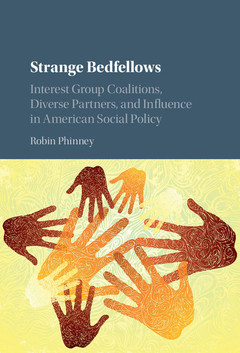Description
Strange Bedfellows
Interest Group Coalitions, Diverse Partners, and Influence in American Social Policy
Author: Phinney Robin
This book develops a new theory of collaborative lobbying and influence to explain how antipoverty advocates gain influence in American social policymaking.
Language: English
Subject for Strange Bedfellows:
Approximative price 107.80 €
In Print (Delivery period: 14 days).
Add to cart
Publication date: 06-2017
196 p. · 15.8x23.4 cm · Hardback
196 p. · 15.8x23.4 cm · Hardback
Description
/li>Contents
/li>Biography
/li>
How do advocates for the poor gain influence in American policymaking? Strange Bedfellows argues that groups representing low-income populations compensate for a lack of resources by collaborating with diverse partners in their lobbying efforts. This study develops a theory of coalition influence that explains the mechanisms and conditions of coalition formation and influence, and provides support for the theory through an analysis of one of the most significant social policy changes in recent history. The analysis shows that in the years preceding the federal welfare reform of 1996, advocates collaborated with diverse partners to influence policymaking, coalitions were used as a tool for pooling different types of resources and communicating information, and groups collaborated selectively across issues. Through rigorous theory and rich qualitative analysis, Strange Bedfellows sheds new light on lobbying and influence in policymaking while offering a theoretical framework for understanding the broader role of coalitions in American politics.
1. Interest groups, lobbying, and influence in American social policy; 2. A theory of diverse coalitions; 3. An empirical investigation of collaboration in the policy process; 4. Policy change and interest group involvement on welfare issues; 5. Organizational advocacy and collaboration in the 104th Congress; 6. Diverse coalitions and resource mobilization; 7. Diverse coalitions and political signaling; 8. The conditions of diverse coalition formation; 9. Interest group coalitions in American social policy: implications and extensions.
Robin Phinney is Research Associate in the Humphrey School of Public Affairs at the University of Minnesota. She received her Ph.D. in Public Policy and Political Science from the University of Michigan, where she received awards including the Ford Fellowship Award, Rackham Predoctoral Fellowship, and Mary Malcomson Raphael Fellowship. Her research and teaching focus on American politics and public policy, with an emphasis on organized interests, the policymaking process, social policy, and the well-being of low-income families. She brings an interdisciplinary perspective to her scholarship, which has been published in leading journals of political science, public policy, and social work.
© 2024 LAVOISIER S.A.S.




